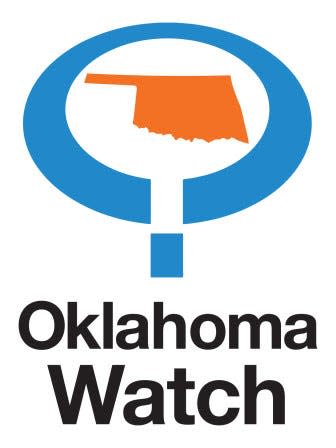Oklahoma's prison population is growing — but its parole rates are plummeting

- Oops!Something went wrong.Please try again later.
Trisha Fox was optimistic when her husband, Richard Fox, appeared on the Oklahoma Pardon and Parole Board docket in early September.
The 63-year-old prisoner, incarcerated since 1980 on a first-degree murder conviction in Caddo County, had not received a misconduct violation since 1995. Letters of support poured in from family, friends and prison ministry volunteers assuring board members he would have stable housing and employment if granted parole.
“He never meant to kill anybody, but he also never denied doing it,” Trisha Fox said, adding that her husband was 19 at the time of the crime. “He’s just someone who deserves a second chance.”
In a 4-1 decision that took a few minutes, the board denied Richard Fox’s application. Trisha Fox said her husband would have progressed through the parole process if board members had more time to consider his case and the opportunity to interview him in person.
“It’s really easy to say no to a piece of paper or a computer,” she said.
As Oklahoma's prison population grows, its parole rate has dropped
Oklahoma’s parole rate has plummeted over the past three years, an Oklahoma Watch analysis of docket results found. Prisoners convicted of violent offenses must progress through a two-stage process with gubernatorial approval required. The board has the authority to release nonviolent offenders to the street.
In 2021, 36% of prisoners who appeared before the board received a favorable recommendation. That percentage dropped to 24% in 2023, with 323 fewer nonviolent prisoners granted parole compared to 2021. At least three of five board members must vote favorably for parole to be granted or recommended to the governor in violent cases.
The decline correlates with a recent uptick in Oklahoma’s prison population. A Bureau of Justice Statistics report released last month found the state’s prison population rose 2.3% from late 2021 to 2022.
The trend isn’t unique to Oklahoma. An October analysis from the Prison Policy Initiative, a Massachusetts-based think tank that advocates for criminal justice reform, found that parole rates declined in all but six states from 2019 to 2022. The analysis concluded that political pressures and attitudes often influence board decisions.
The makeup of Oklahoma’s parole board has shifted considerably over the past two years. Noting that his beliefs on capital punishment differed from Gov. Kevin Stitt, former board chairman Adam Luck resigned in January 2022. Luck, the chief executive officer of an Oklahoma City nonprofit that supports people facing poverty and homelessness, faced criticism from some district attorneys over his propensity to recommend clemency for death row prisoners.

“It is time that we do better,” Grady County District Attorney Jason Hicks said during a March 2021 news conference held weeks after commutation recipient Lawrence Paul Anderson murdered three people in Chickasha. “We don’t want these people on our street.”
Kelly Doyle, a trained social worker and leader of a Tulsa-based nonprofit, resigned unexpectedly from the parole board in March 2022. Similar to Luck, district attorneys criticized Doyle over a perceived leniency in recommending clemency for death row inmates and parole for prisoners convicted of violent offenses.
What challenges does the Oklahoma Pardon and Parole Board face?
Of the board’s five current members, four have a background as a district attorney, judge or police officer. The longest-tenured member is Richard Konieczny, a retired Episcopalian priest and police officer whom Gov. Stitt appointed to replace Luck in January 2022.
Sue Hinton, a retired English professor at Oklahoma City Community College, became interested in criminal justice reform when she started teaching classes at state prisons in the 1980s. After retirement, she began attending Pardon and Parole Board meetings, compiling unofficial data on the board’s decisions.
She said the board is much more likely to consider early release if a prisoner personally appears before the parole board. But because the board functions in a part-time capacity and Oklahoma’s prison population has soared since the body was formed in 1944, that’s not feasible in most cases.
“Depression is the prevailing state of mind,” Hinton said of parole applicants. “They’re not gang members, not troublemakers, and have a heart of good citizenship, but they don’t feel like there’s a reward.”
Hinton said board members face extraordinary outside pressure and are often predisposed to reject an application if they do not have enough information. Making the board full time could allow members more time to review cases, she said. Oklahoma parole board members are classified as part-time state employees and expected to work about 10 hours per week.
Parole board members in neighboring Colorado, Kansas, Missouri, Texas and Arkansas are classified as full-time state employees. In Texas, whose state prison population is about five times greater than Oklahoma, board members earn an average salary of well over $100,000.
Richard Fox won’t be eligible to reapply for parole until September 2026. Trisha Fox said she’s hopeful a proposed overhaul of the state’s criminal sentencing code will take effect and make her husband eligible for early release before then, but in that scenario his fate would again rest with the parole board.
“When you listen to them and how fast they go, it’s just no, no, no, on to the next one,” she said. “It’s like they already made up their mind when they got there.”
Pardon and Parole Board guidelines advise members to consider the nature of a parole applicant’s crime, criminal history, participation in prison programs and misconduct history. District attorneys are also allowed to oppose or protest a parole application ahead of a board hearing.
Oklahoma Watch, at oklahomawatch.org, is a nonprofit, nonpartisan news organization that covers public-policy issues facing the state.
This article originally appeared on Oklahoman: Oklahoma Pardon and Parole Board granting parole to fewer prisoners

